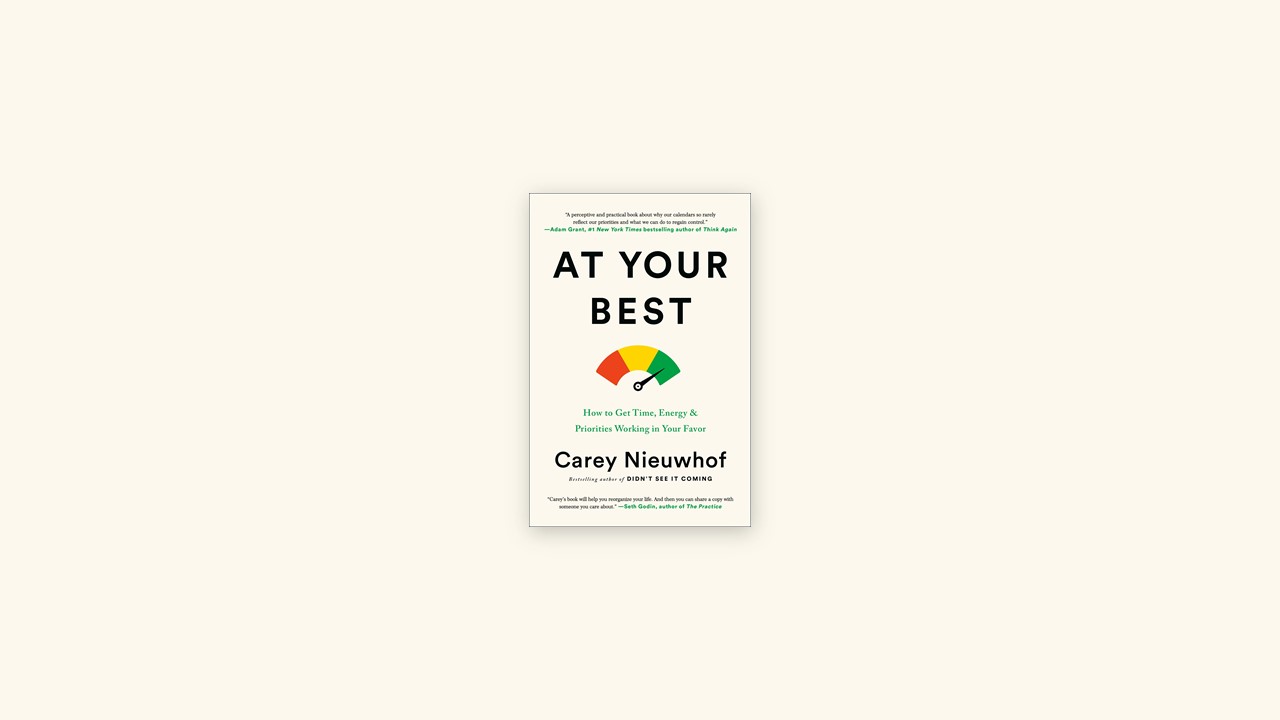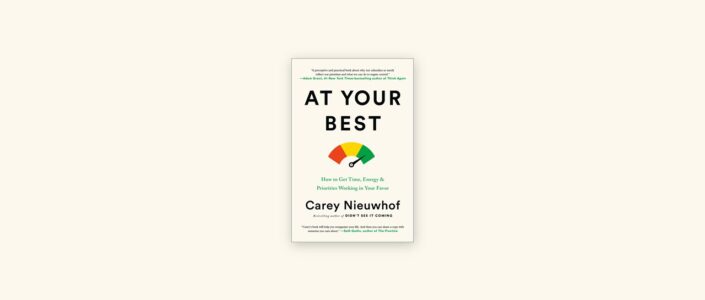Build a Life You Don’t Want to Escape From
The typical formula for growth is as simple as it is stupid: more people equals more hours.
Many people are overwhelmed, overcommitted, and overworked doing exactly what they thought they wanted to do with their lives.
If you don’t declare a finish line to your work, your body will.
Workaholism is the most rewarded addiction in our society.
Top performers do what they’re best at when they’re at their best—they work in their area of principal gifting and passion when their energy is at its highest.
Everybody gets three primary assets every day: time, energy, and priorities.
When you don’t have an intentional strategy, then time, energy, and priorities work against you, not for you.
You can protect your time, prioritize your family, and still crush it at work.
Constant stress denies many people permission to dream or to accomplish what they’re called to do.
No More Crazy Busy Life
Even decently rested people who have friends and can bench-press a tiny house are stressed out.
Time off won’t heal you when the problem is how you spend your time on.
Days off, vacations, and even sabbaticals aren’t a complete solution for an unsustainable pace. A sustainable pace is the solution for an unsustainable pace
The Thrive Cycle focuses your time, leverages your energy, and realizes your priorities so you can be at your best. It ensures you live in a way today that will help you thrive tomorrow.
Focusing your time helps you get more accomplished in less time.
Rather than competing with your energy levels, cooperate with them.
When you leverage your energy, you’ll realize you’re capable of producing not just more work but much better work than you thought possible.
Calendaring your energy zones, priorities, and key relationships will move everything you’ve learned from intention to reality.
Winning at work while losing at home means you’re losing. Period.
You are at your most kind when you have the most margin.
Living in the Thrive Cycle will free up between three hours a week and three hours a day of newly productive time. That could amount to more than a thousand additional productive hours each year.
You Actually Do Have the Time
When it comes to time, you and I are rich. In fact, we’re loaded. Time doesn’t discriminate. With the two exceptions of the day you’re born and the day you die, everyone gets exactly the same amount of time every day.
Time doesn’t grow. It won’t expand, which is why time management brings you diminishing returns.
You can make excuses or you can make progress, but you can’t make both.
Stop saying you don’t have the time. Start admitting you didn’t make it.
Most people who accomplish significant things aren’t balanced people; they’re passionate people.
Balanced people don’t change the world. Passionate people do.
Find Your Green Zone
Even though you have twenty-four equal hours in a day, not all hours feel equal.
Most people have three to five deeply productive hours in a day.
Green Zone: When your energy is high. Your mind is clear, and your focus is sharp.
Three leveraged hours beats ten unleveraged hours.
Red Zone: When your energy is low. You struggle to pay attention, and you find it very difficult to produce meaningful work.
Yellow Zone: When your energy is in the middle. You’re neither at your best nor at your worst.
Leverage your energy (or lack of it). Don’t fight the patterns; fuel them.
Yellow Zone, Red Zone, and Other Real-Life Problems
Do your moderately important tasks in your Yellow Zone, when you have a moderate amount of energy.
Do your least important tasks in your Red Zone, when you have the least amount of energy.
The biggest Red Zone mistake you can make is to leave important decisions or critical tasks for this zone.
When you don’t have complete control over your calendar, focus on what you can control, not on what you can’t. And there’s a surprising amount you can control.
You and your time are far less controlled by other people than you think.
Be spectacularly good at what you do, and you might be surprised at how eager your employer is to make changes to accommodate you.
Being around is no guarantee that anything relationally significant will happen, but not being around is an absolute guarantee that nothing relationally significant will happen.
“Whether you believe you can do a thing or not, you’re right.”
Distraction-Free
Average users touch their phones 2,617 times a day. Heavy users touch their phones 5,427 times a day.
When technology runs us, it can ruin us. Technology makes a wonderful servant but a terrible master.
The opposite of distraction isn’t focus; it’s traction.
Paying attention to the wrong things costs you your priorities. Your goals. Your productivity. Your health. Even your family. And eventually it costs you your potential and your dreams.
In the same way that not all hours are created equal and not all tasks are created equal, not all environments are created equal.
Find or create the most undistracted environment you can for your Green Zone.
Notifications on your devices make you access content on other people’s schedules, not yours.
Early mornings can be especially productive, not because you don’t notice the distractions but because those distractions aren’t there in the first place.
What About People?
The people who want your time are rarely the people who should have your time. And the people who should get most of your premium time rarely ask you for it.
If you spend most of your time with draining people, you’ll live much of your life feeling drained.
Spend most of your time with the people who produce most of your results and the least amount of time with the people who don’t. In your personal life, spend 80 percent of your time with the people you care most about, leaving 20 percent for others.
People are hardwired for three to five close friendships, twelve to fifteen friendships, and 150 personal relationships.
You were designed to handle between three and 150 relationships in a meaningful way, but social media will pressure you to connect with far more.
Despite being designed to handle up to 150 personal relationships, social media pressures you to connect with far more people.
People have far better manners than technology does.
The deepest relationships rightly belong with the closest connections.
Stop treating everyone the same, because all relationships aren’t the same. The depth of the relationship should determine the depth and speed of your response.
Hello from the Future You
Doing what you’re best at when you’re at your best is the best way to escape the Stress Spiral and live in a way today that will help you thrive tomorrow.
The dopamine hits that progress generates are motivating, but character formation and growth are more deeply motivating.
Doing what you’re best at when you’re at your best is to some extent about what you accomplish, but to a much deeper extent, it’s about creating the space you need to focus on who you’re becoming.
Who you’re becoming is so much more important than what you’re doing.


